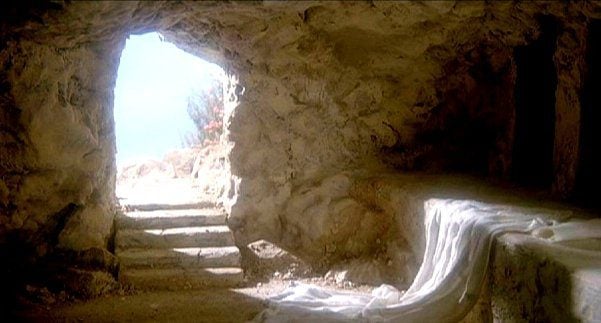On this Holy Saturday, the New York Times published an interview with Serene Jones, the president of Union Theological Seminary. In it, she says the following when asked whether she believes that Jesus was physically resurrected:
When you look in the Gospels, the stories are all over the place. There’s no resurrection story in Mark, just an empty tomb. Those who claim to know whether or not it happened are kidding themselves. But that empty tomb symbolizes that the ultimate love in our lives cannot be crucified and killed.
She goes on to say:
For me, the message of Easter is that love is stronger than life or death. That’s a much more awesome claim than that they put Jesus in the tomb and three days later he wasn’t there. For Christians for whom the physical resurrection becomes a sort of obsession, that seems to me to be a pretty wobbly faith. What if tomorrow someone found the body of Jesus still in the tomb? Would that then mean that Christianity was a lie? No, faith is stronger than that.
Now before I begin my response to these statements, I need to acknowledge that one of the most spiritually attuned, radically empathetic, beautiful souls I’ve ever known belonged to someone who said she couldn’t go into ordained ministry because she didn’t believe in the resurrection. When she confessed this to me, it put me in a theological quandary, because I believe that orthodox Christian theology matters insofar as it allows us to gain the most intimate possible union with Christ. It is the heart intimacy which reshapes us, makes us holy, and incorporates us perfectly into the body of Christ. So if the resurrection matters as a doctrinal point, then one’s belief or lack of belief in it ought to be manifested in one’s level of spiritual maturity, at least according to how I understand things. Except God often doesn’t play by my rules.
There are people with unorthodox beliefs about God who literally glow with Christ and people with flawless beliefs about God who utterly lack Christ’s love. I would much rather build a spiritual community with people whose beliefs are shaky but hearts are absolutely open to the Holy Spirit than build one with people who use their correct cognitive beliefs as a substitute for wholehearted discipleship. I don’t think that people who have hangups about the resurrection are somehow devoid of spiritual connection with God, because I don’t think God operates that way, and yet I do suspect that there are intimacies that are harder for them to experience. We are not punished and rewarded for our beliefs, but our beliefs do open or hinder us to certain levels of connection with God (with the caveat that God can always miraculously burst through any doubts that we have).
So why does Jesus’ physical resurrection matter? I suspect it probably doesn’t matter very much if you live a mostly privileged life: if you don’t have any chronic illnesses or physical deformities, if you’ve never run out of money, if you’ve never had to bury your own child, if you don’t come from a people who have been enslaved or oppressed by another group of people, if you don’t have a need for history and biology to be utterly disrupted by something completely inexplicably discontinuous with how things have always been.
The theologian Jurgen Multmann wrote in one of his books that hope is a belief in a radically discontinuous future (futurus) that isn’t simply the logical continuation of the past (adventus). This is different than a belief in progress, that things are naturally getting better over time. For privileged liberals, that is people who value fairness and open-mindedness and have little personal experience of desperation, the myth of progress tends to be the most compelling story about humanity. To people who believe that things are naturally getting better all the time and the greatest obstacle are conservatives who cling to ancient books and traditions, Jesus’ resurrection probably seems like one of the conservative beliefs that must be cast aside so that Christianity can make progress.
So for whom does the resurrection matter? I’m not the best example of someone who needs the resurrection to matters, because I’ve never run out of money and there’s very little chance I would be shot without provocation if I ran into a cop in a dark alley. But I do have intestines that are broken, which means that I will shit my pants if I ever have to travel long distances in a vehicle that has no on-board bathroom (like in Uganda where I’m going in a month) or if I find myself walking around in a part of a city where no commercial establishment is open (like downtown New Orleans more than once). It’s also most likely that I will one day die of colon cancer or another complication related to my ulcerative colitis.
I need a God who does resurrection, because I need a resurrected body. The thought that God is not allowed to violate the laws of science (and offend the sensibilities of liberal intellectuals) infuriates me because it means that I’m stuck in this body and I will never get a chance to experience again one day what it’s like not to be sick all the time. Now I have a relatively minor complaint. If I take my meds and respect the limitations of my disease, I will live a mostly normal life. I just always have to be within five minutes of a bathroom, and my life expectancy might be a decade shorter.
Resurrection matters on a whole different level to a Tutsi woman whose whole family was massacred by the Hutus during the Rwandan genocide of 1994, or a man who spends most of his life in prison after being falsely convicted for a crime because of racism, or a Palestinian family whose olive orchard and 100+ year old farmhouse are bulldozed by the Israeli army. If God can actually reach into space and time in order to vindicate Jesus for his unjust death by raising him from the dead, then despite the impossible hopelessness of our sinful world, God has the power to vindicate the victims of injustice and tragic life circumstances in a similar way, whatever that will look like.
Resurrection is not something to believe in because it’s reasonable. It’s something you believe in because you can’t bear the thought of it not being possible. I know there are plenty of people without privilege who don’t have Jesus’ physical resurrection as part of the story they tell themselves to keep hope alive. That’s fine. No disrespect to you. Just please don’t belittle me for needing to include in my story the hope that whatever raised Jesus physically and completely from the dead also has the power to heal my body physically and completely in some mysterious future.
If “love” is in fact “stronger than death” and that isn’t just a vacuous, half-hearted phrase we use at funerals to reassure the bereaved, then love can do things like break the rules of science. I’m not going to tell people like Nicholas Kristof who don’t believe in miracles that they can’t be Christians. To me, being a Christian is about following Jesus. I believe that when people seek Jesus tenaciously with an open heart and mind, God helps them work through whatever hangups they need to work through in order to be the disciple they need to be (and many great disciples never work through all their hangups!). For me, the hope of the resurrection is a promise that inspires me to keep fighting for the mysterious, impossibly wonderful kingdom Jesus is bringing into our world.
Check out my book How Jesus Saves the World From Us: 12 Antidotes To Toxic Christianity!













